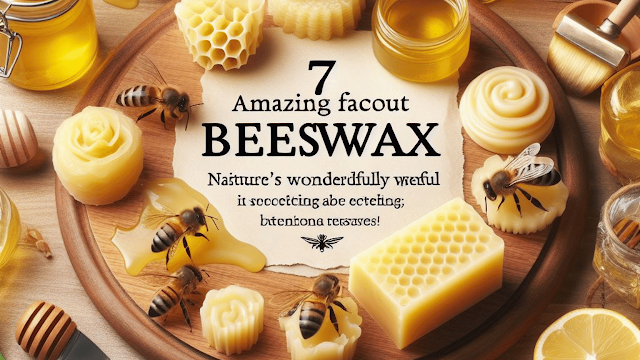7 Amazing Facts About Beeswax: Nature's Wonderfully Useful Wax
Beeswax
is more than just honeycomb! Explore its surprising properties, from its
natural origin to its diverse uses. Discover why this bee byproduct is a
sustainable and versatile wonder.
7 Amazing Facts About Beeswax
Introduction
Beeswax,
a natural substance produced by honeybees, is a fascinating material with a
rich history of human use. Beyond its association with honeycombs, beeswax
boasts a surprising number of properties that make it incredibly useful. From
its antibacterial qualities to its high melting point, this bee byproduct is a
true gift from nature. In this article, we'll delve into seven amazing facts about beeswax that will change the way you see
this remarkable substance.
1: A Natural Wonder Produced by
Honeybees
Beeswax
is not a byproduct of honey production, but rather a specially crafted material
made by worker bees. These industrious insects have eight wax glands on their
underside, which secrete thin flakes of wax. The bees then chew and manipulate
these flakes, mixing them with saliva to create the building blocks of their
honeycomb.
2: Surprisingly High Production
Costs
One
pound of beeswax requires a significant investment from the hive. Worker bees
need to consume roughly eight pounds of honey to produce just one pound of wax.
This highlights the incredible value that bees place on this material and
underscores the importance of sustainable beekeeping practices.
3: Antibacterial and Antifungal
Properties
Beeswax
possesses natural antibacterial and antifungal properties. This makes it ideal
for wrapping food, as it can help prevent the growth of harmful bacteria and
mold. Studies have even shown that beeswax can inhibit the growth of common
foodborne pathogens [1].
4: Safe and Edible
Unlike
many synthetic materials, beeswax is completely safe for consumption. In fact,
it's sometimes used as a coating for certain candies and fruits. While not
exactly a common ingredient, it's a testament to the natural and non-toxic
properties of beeswax.
5: A Burning Passion: Beeswax
Candles
Beeswax
candles are a popular choice for many reasons. They burn cleaner than paraffin
wax candles, releasing fewer pollutants into the air. Additionally, beeswax candles
emit a pleasant, honey-like aroma when lit, creating a warm and inviting
atmosphere.
6: Beyond the Flicker: Other Uses
for Beeswax
The
uses of beeswax extend far beyond candles. It's a key ingredient in many
natural polishes and furniture waxes, thanks to its water-repellent properties
and ability to create a beautiful shine. Beeswax is also used in cosmetics,
pharmaceuticals, and even in the production of musical instruments.
7: Sustainable and Eco-Friendly
Beeswax
is a naturally renewable resource, making it a sustainable alternative to many
synthetic materials. By choosing beeswax products, you're not only supporting
beekeepers but also contributing to a more eco-friendly lifestyle.
8: Easy to Use and Long-Lasting
Beeswax
is a versatile material that's relatively easy to use at home. You can find
beeswax wraps for food storage, which are a great alternative to plastic wrap.
Beeswax polishes are also simple to apply and leave a long-lasting shine on
furniture and wood surfaces.
Conclusion
Beeswax
is a truly remarkable substance with a wide range of applications. From its
natural origin to its surprising properties, beeswax offers a sustainable and
versatile alternative to many synthetic materials. By choosing beeswax products,
you're not just making a practical choice, you're supporting the vital role
that bees play in our environment.
Recommendations
- Look for beeswax products from local beekeepers to ensure ethical and sustainable sourcing.
- Explore DIY projects using beeswax, such as making your own candles or furniture polish.
- Spread awareness about the importance of bees and the value of beeswax as a natural resource.
FAQs
Q: Is beeswax safe for pets?
A:
While generally safe, it's always best to consult a veterinarian before
introducing any new substance to your pet's environment.
Q: How can I tell if a product is made with real beeswax?
A:
Look for labels that clearly state "beeswax" as an ingredient. You
can also check for the National Sunflower Alliance (NSA) certification, which
guarantees the use of pure beeswax.
Q: Is beeswax vegan?
A:
No, beeswax is not considered a vegan product as it's an animal byproduct.
Additional Tips and Tricks
- Beeswax can be reused and refreshed. Beeswax wraps can be washed with cool water and mild soap, while beeswax furniture polish can be rewarmed to restore its consistency.
- When storing beeswax products, keep them in a cool, dry place away from direct sunlight.
- Beeswax is a natural fire starter. You can create fire starters by soaking small pieces of fabric or cardboard in melted beeswax.
By
incorporating these amazing facts and tips, you can appreciate the true value
of beeswax and make informed choices to support a sustainable future.
